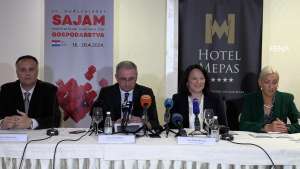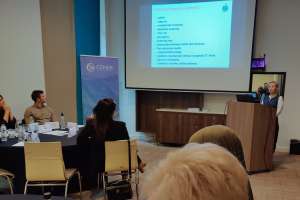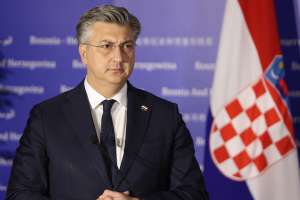SARAJEVO, February 26 (FENA) - A six-month presidency of the Council of the European Union is a very challenging undertaking for every member state, requiring the highest degree of administration preparedness of a state, and for Croatia, this role is additionally important as it is the youngest EU member and it takes on this role for the first time, said in an interview with FENA the Croatian Ambassador to Bosnia and Herzegovina Ivan Sabolić.
As Sabolić explained, apart from additional affirmation on the European and international political arena, Croatia has the opportunity to present its contemporary art to the international audience, but also to present valuable Croatian cultural heritage.
During the Presidency, in addition to two summits of the EU heads of states, 13 informal Council of Ministers meetings are being organized, meeting in Brussels in ten different thematic formats, nine ministerial conferences, four meetings of the Presidents of Parliaments and more.
“I particularly emphasize the EU-Western Balkans Summit, which will be held in Zagreb in early May, as well as the EU-Eastern Partnership Summit in Brussels. During the Croatian presidency, 165 events will take place in Croatia alone,” the Ambassador explained.
He noted that the success of the Croatian Presidency will not only be judged by the quality of the activities envisaged, but also by the acquired skills, knowledge and abilities of the Croatian state administration to participate even more successfully in the work of the EU bodies, which is a long-term interest and goal of Croatia.
Speaking about the focus of the six-month presidency, he said that he wanted to build a stronger, more developed, connected, secure and globally more influential European Union for citizens and member states in partnership with the member states and all institutions.
“Priorities are everything we can put in the context of further strengthening European unity and community, development, economic growth of all EU member states, environmental sustainability, strengthening and continuation of cohesion policy, demographic revitalization, strengthening competitiveness, transport connectivity, strengthening citizens' security, protecting the external border and demographic change, strengthening the EU's influence in the neighborhood and the world, and encouraging continuous reform processes in Southeast Europe,” said Sabolić.
He stressed in the interview that the Croatian Presidency is taking place at an important time for the future of Europe, in which a multi-annual European budget is being decided, and the United Kingdom and the EU are beginning negotiations on future relations.
Also, during the Croatian Presidency, the Conference on the Future of Europe will begin, which must bring the European project closer to European citizens over the next two years.
Asked if Croatia would also advocate for EU enlargement to the Western Balkan countries, including BiH, Sabolić emphasized that the reaffirming of the enlargement policy was one of their priorities, adding that they again brought up the question of EU enlargement and support to the neighboring countries on the European path.
As he announced, Croatia is determined to take a responsible role in the continuation of the enlargement process, as it is in the political, economic and security interest of Croatia and the entire EU.
“Believing strongly in the European identity of the countries of the European Southeast, we emphasized in our program that we will strive for the continuation of a consistent, effective and credible enlargement policy, based on the confirmed European perspective of candidates and potential candidates with full fulfillment of the established criteria,” added the Ambassador.
He said the Zagreb Summit would be a great opportunity to convey the message that the EU remains committed to enlargement policy and a clear perspective on the membership of the countries of this part of Europe, and that the role of the summit is to offer a realistic assessment of everything that needs to be done to strengthen the accession processes of these countries and provide new momentum in the dynamics of their approaching the EU in the years to come.
In doing so, Sabolić says, it will also be necessary to look at current processes within the EU, its new financial framework and the atmosphere towards enlargement policy in the member states.
Croatia wants the summit to be a kind of milestone in enlargement policy, to clarify further dynamics for the neighborhood countries, and the European Commission document on enlargement methodology fits in with the goals of the summit, which emphasizes predictability, credibility, stronger political governance and process efficiency.
The Croatian Ambassador to BiH reiterated that European unification cannot be completed until all the countries of Southeast Europe have gradually become EU members, adding that the dynamic can be discussed, but the goal should not be questioned because “these are the doors we want to keep open".
It is a process in which no one should lag behind, saying that it is necessary to encourage the ongoing and persistent dialogue.
Regarding Croatia's relations to BiH, specifically in the context of its path towards the EU, the Ambassador notes that it is especially important for Croatia for BiH to make progress, where Croatia has a special interest because of the Croat people who are constituent people in BiH, but also for the sake of good neighborly relations.
“Croatia strongly supports the European perspective of BiH, where EU membership is a strategic goal and a determination of a large part of the population. As we have clearly emphasized in the priorities, the Croatian Presidency will especially strive for potential progress towards a candidate status,” he said.
It is therefore important to encourage BiH to carry out the necessary reform processes, which will be recognized and positively evaluated, since the success on the European path and the strengthening of the European perspective of BiH, while respecting its specificities, are inextricably linked to the concern for a stable and prosperous BiH, with full consensus of the constituent peoples and all the citizens of BiH.
Bosnia and Herzegovina has a friend and partner in Croatia, the Ambassador says, which is ready to help in its position as an EU member, but also with experience gained during the negotiation process, since experience from that demanding process, as well as the challenges faced in the early years as an EU member, can be of great use to BiH.
As proof of this commitment, the Ambassador singled out several projects that are being mplemented in BiH, involving institutions from Croatia, in line with strategic guidelines for assisting neighboring countries in their accession to the EU.
During its seven years of EU membership, Croatia has implemented 28 projects in eight countries alone, or in partnership with other EU member states, and the Twining instrument has been one of the key tools in supporting the preparations for EU accession.
“We have implemented over 200 projects as a beneficiary country and gained extensive experience in their implementation. We are now successfully transferring knowledge and experience to the BiH institutions. In this way, in addition to promoting European standards and values, we also promote good neighborly cooperation,” says Sabolić.
Croatian Ambassador to BiH Ivan Sabolić, at the end of the interview, also referred to bilateral relations between the two countries, saying that Croatia is particularly concerned with relations with BiH, especially the position of Croats as the smallest constituent people.
He noted that Croatia is continuously providing full support to friendly and neighboring Bosnia and Herzegovina when it comes to its EU and NATO integration paths, and also remains committed to further developing political cooperation and strengthening economic and other relations.
Therefore, Sabolić concluded, when it comes to any outstanding issues, they should be addressed through open communication and mutual respect, which will also contribute to the further development of good neighborly cooperation in the whole of Southeast Europe.
(FENA) S. R.












